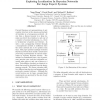Free Online Productivity Tools
i2Speak
i2Symbol
i2OCR
iTex2Img
iWeb2Print
iWeb2Shot
i2Type
iPdf2Split
iPdf2Merge
i2Bopomofo
i2Arabic
i2Style
i2Image
i2PDF
iLatex2Rtf
Sci2ools
129
click to vote
UAI
1992
1992
Exploring Localization in Bayesian Networks for Large Expert Systems
Current Bayesian net representations do not consider structure in the domain and include all variables in a homogeneous network. At any time, a human reasoner in a large domain may direct his attention to only one of a number of natural subdomains, i.e., there is `localization' of queries and evidence. In such a case, propagating evidence through a homogeneous network is inefficient since the entire network has to be updated each time. This paper presents multiply sectioned Bayesian networks that enable a (localization preserving) representation of natural subdomains by separate Bayesian subnets. The subnets are transformed into a set of permanent junction trees such that evidential reasoning takes place at only one of them at a time. Probabilities obtained are identical to those that would be obtained from the homogeneous network. We discuss attention shift to a different junction tree and propagation of previously acquired evidence. Although the overall system can be large, com...
Related Content
| Added | 07 Nov 2010 |
| Updated | 07 Nov 2010 |
| Type | Conference |
| Year | 1992 |
| Where | UAI |
| Authors | Yang Xiang, David Poole, Michael P. Beddoes |
Comments (0)

